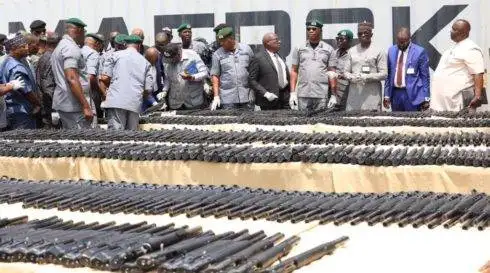
Available data indicate that between 2008 and 2020, different sizes of arms with varying values were imported into Nigeria. For instance, in 2020, US$125 million worth of arms were imported into Nigeria. The largest value was reached in 2010 and 2014, when US$188 million and US$218 million worth of arms, respectively, entered Nigeria. The import of arms covers the supply of military weapons through sales, aid, and gifts.
Similarly, Nigeria imported arms and ammunition worth N15.8 billion in the first half of 2022, representing a 60.3% decline compared to N39.8 billion recorded in the corresponding period of 2021. This is according to the breakdown of the foreign trade report released by the National Bureau of Statistics (NBS).
Compared to the second half of 2021, Nigeria’s ammunition import declined by 71.8% from N56.1 billion recorded between July and December 2021. On an annual basis, a total of N72.49 billion was used to import weapons in 2021 as against N29.34 billion and N12.77 billion recorded in 2020 and 2019 respectively. In 2018 only N1.95 billion was used to import weapons into the country.
While there are available statistics for legal shipments, the same can not be said about the large cache of illegally imported arms and ammunitions, that have found their ways into the country, and which are being used to terrorise hapless Nigerians and non-Nigerans alike.
Of recent, there has been an upsurge in arms and ammunitions importation. This is going by the seizures that were made by the Nigeria Customs Service.
On Monday July 1, 2024, the Comptroller-General, Nigeria Custom Service; Bashir Adewale Adeniyi disclosed that 844 units of assorted riffles, 112,500 pieces of live ammunition were intercepted at the Onne Port in Rivers state.
And by Wednesday, that is, two days after the Onne port seizures were unfolded to the media, the Customs boss also told the media at the Murtala Muhammed Airport Command in Ikeja, Lagos that the service has seized a large cache of unassembled firearms and military paraphernalia.
The sudden rise in weapon seizure is not an indication that these dangerous imports are not getting into the country. It only indicates that the Nigeria Customs Service is becoming more conscious of its responsibilities.
It is worrisome that even though there was a decline in the official figures released, the recent seizures perhaps gave an incline to why there has been an increase in banditry and other voices. This surge remains a security concern and it is also affecting the lives of the people as well as the economy. The food-producing region of the country has suffered various attacks in the past 11 years, causing a significant setback in the agricultural sector.
According to the United Nations Development Programme report, these attacks have led to a decline in agricultural production and trade, reducing access to food and threatening the many households who depend on agriculture for income.
The report also says that, several thousand Nigerians have been displaced from their homes, often leading to loss of livelihoods, assets, and critical support systems. This has also led to huge migration, causing overcrowding in some areas of the country that is perceived as safe.
Similarly, the impact of this insecurity on foreign investment can not be overemphasized, with foreign direct investment dragging at record lows, and portfolio investments at record lows.
It is shocking that, just as it happened in 2017, the source of these arms and ammunition is Turkey. We recall that in 2017, when there was an upsurge as Nigeria is witnessing currently, the Federal Government attempted a diplomatic approach to the matter.
The then-President Muhammadu Buhari and the then-Comptroller-General of Nigeria Customs Service (NCS), Col. Hameed Ali (rtd) were reported to have gone to Turkey for a bilateral meeting with the Turkish Government and the country’s Customs Authority.
Prior to the visit to Turkey, Col Alli had at a meeting with the Turkish Ambassador to Nigeria, Hakan Cakil, expressed deep concerned that four recent major seizures of illegal arms came from Turkey.
However, these seizures are a confirmation of the existence of a gun-running syndicate with a chain of connections between the importers, customs officers and clearing agents in Nigeria.
In 2017, the explanation was that to facilitate the illegal importation, the syndicate allegedly forged a number of documents including a bill of lading, and a ‘Form M and a Pre-Arrival Assessment Report.
Sadly, since 2017 when the arms and ammunitions started coming in again, no one has been arraigned and successfully prosecuted to date. We are however aware of the claim by the Nigeria Customs Service that some officers were dismissed for their roles in the importation.
But this should not be the end. Why is it difficult to unravel the identity of members of the syndicate?
Perhaps, a clue may be found in what the chairman of the House of Representatives Committee on Customs and Excise; Mr Leke Abejide said during recent visit by the committee to the Customs.
He said the committee was ready to probe activities within bonded terminals and free trade zones nationwide to address cases of illegal arms importation into the country.
Will it be true to assume that the lawmaker knows more about the syndicate that the government has divulged so far? Or is the usual grandstanding as has been witnessed in the past
Whatever it is, the recent influx that have been linked to the same source as in 2017 requires more than a passing attention. It is time the Federal Government unmasked the syndicate behind it all,















